Student Achievement Partners is excited to release a new instructional practice framework. In this post, members of the design team behind the new e2 Instructional Practice Framework™ share why the framework was created, what it is designed to do, and how it can improve educational experiences and outcomes for K-12 students. The e2 Instructional Practice Framework™ communicates an evidence-based definition of high-quality instruction that deepens and amplifies our commitment to Essential literacy and mathematics through the pursuit of Equitable instruction for all students.
Why did Student Achievement Partners set out to create this Framework?
Since our founding, Student Achievement Partners has been deeply committed to ensuring that all students, no matter who they are or where they live, are supported to access and successfully engage with grade-level literacy and mathematics content in the classroom. Supporting educators in using evidence-informed practices to improve educational experiences and outcomes for all students has always been at the heart of our work. That’s what led us to create our Instructional Practice Guide in 2013.
Our goal with the new e² Instructional Practice Framework™ is to build on that foundation to address the reality that our public education system does not yet realize the potential of all students, an issue that is most acutely experienced by Black students and multilingual learners. Student Achievement Partners’ e² Instructional Practice Framework™ helps educators design instruction that leverages the assets and honors the brilliance of students who have been historically underserved and marginalized by our education system—a crucial step in supporting all students.
The e² Instructional Practice Framework™ is rooted in a theory of action for supporting teachers and students to create high-quality instructional experiences that optimize learning. This theory of action emphasizes Essential grade-level mathematics and literacy content and includes an intentional focus on fostering instruction that creates belonging, agency, and strong identities as learners.
Student Achievement Partners remains focused on strengthening the instructional core—the interactions among students, teachers, and content in the classroom— and committed to Essential literacy and mathematics through the pursuit of Equitable instruction for all students. The e² Instructional Practice Framework™ speaks to both the evolution of Student Achievement Partners’ work and the evolution of what practitioners and researchers understand all students need to feel and be academically successful: Essential instruction is equitable, and Equitable instruction is essential in our work to improve educational experiences and outcomes in K-12 classrooms.
What is Essential x Equitable instruction?
The e² Instructional Practice Framework™ re-defines high-quality instruction. It’s this evidence-based definition that guides Student Achievement Partners’ work. This framework brings together often disconnected strands of research on instructional practice and practitioner knowledge to support and guide change with a cohesive vision of student-centered, high-quality instruction. It is intended to serve as a resource for educators and organizations who share this vision of teaching and learning.
Essential x Equitable instruction is defined by four categories of high-quality instruction: Grade-Level, Joyful, Linguistically Sustaining, and Culturally Responsive-Sustaining. Under each of these categories, there are three tenets that further define the focus of these areas of instruction. Though these four categories are presented separately, they are complementary and intertwined when translated into action in everyday classroom instruction.
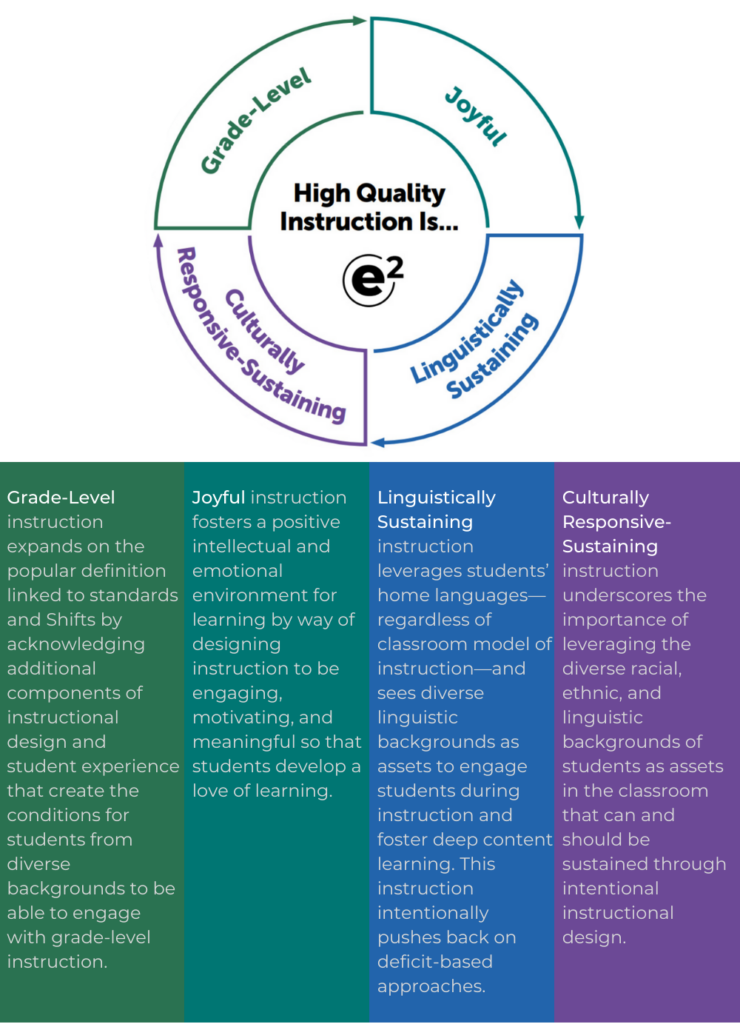
Taken together, these four categories represent a unified picture of best practice in a classroom. e² instruction is a cohesive, systemic approach to teaching and learning that requires the support of multiple stakeholders for it to be realized within any district or school. It focuses on what is possible within classroom instruction while acknowledging that students’ lives and educational outcomes are also shaped by their experiences outside of school. Students are part of broader families and communities, and educators must understand both the opportunities and limitations this reality provides in order to work toward the e² vision of high-quality instruction.
How can the e² Instructional Practice Framework™ support educators in improving educational experiences and outcomes for students?
The e² Instructional Practice Framework™ was inspired and informed by the work Student Achievement Partners has done over the past decade with schools and districts across the country, and it was refined through collaboration and partnership with an established Advisory Board, Educator Cohort, and a community of experts across the education field. With their guidance and thoughtful feedback, we designed this resource to demonstrate the possibilities and promise of a student-centered vision for instruction. Together, with the collective input of our partners and our own experiences in classrooms and schools, we sought to identify the barriers educators face as they try to get closer toward that vision.
A key challenge educators identified is the lack of cohesion to support a throughline between multiple models and approaches all aimed at improving student experiences and educational outcomes. They named that without this throughline, it’s much harder for individuals at all levels of the education system to work together effectively toward a common goal. The e² Instructional Practice Framework connects the dots across multiple areas of instructional design to get everyone on the path toward a shared vision and approach.
Relatedly, the development of the e² Instructional Practice Framework™ is part of a broader effort to support educators and practitioners at all levels of the system. This effort involves developing and curating resources that provide actionable guidance to identify and understand what’s happening in classrooms across a school or district, deepen their knowledge about what should be happening and how, and respond with coherent, collective action. The e² Instructional Practice Framework™ and related suite of tools will foster a shared understanding of, and progress toward, a vision of high-quality instruction in K-12 classrooms that centers students.
We invite you to explore the e² Instructional Practice Framework™ and consider taking the following action steps to work toward Essential x Equitable educational experiences for your students:
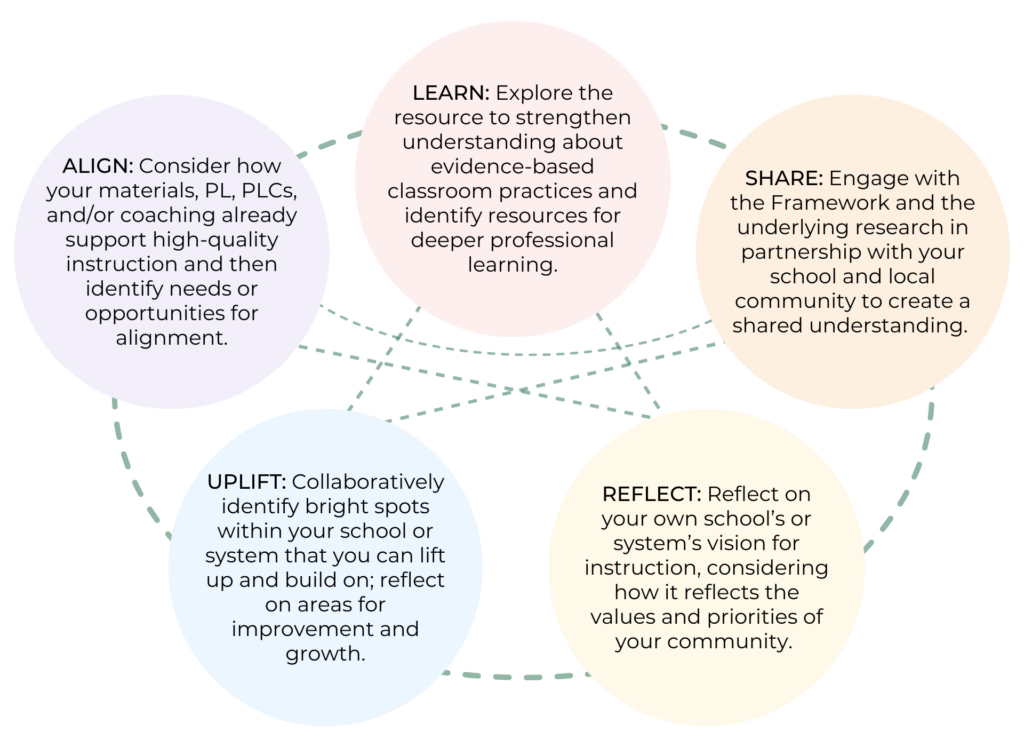
Ultimately, our design team created the e² Instructional Practice Framework to honor the past, speak to the present, and commit to a new future for K-12 students and their experiences in classrooms. We are grateful to the community whose work has culminated in the creation of this resource and look forward to continuing to build a community that will actualize these intentions.
Does Student Achievement Partners offer other resources and services to help implement this Framework?
Yes! Alongside the e² Framework for Equitable x Essential Instruction™, Student Achievement Partners is launching a suite of customizable instructional tools designed to support every aspect of your instructional plan. The e² Instructional Practice Suite™ is designed to equip instructional leaders with the tools to build a shared vision, understand the current state of teaching and learning in their schools relative to that vision, and take action to further deliver on the promise of relevant, engaging, grade-level instruction for all students.
The tools are designed to be flexible. You can engage with Student Achievement Partners to adapt tools to reflect specific language, align to instructional materials, and implement across a variety of contexts. If you’d like to build a customized tools suite or set of supports to get your team onboarded, please reach out to our team at partnerships@studentsachieve.net.

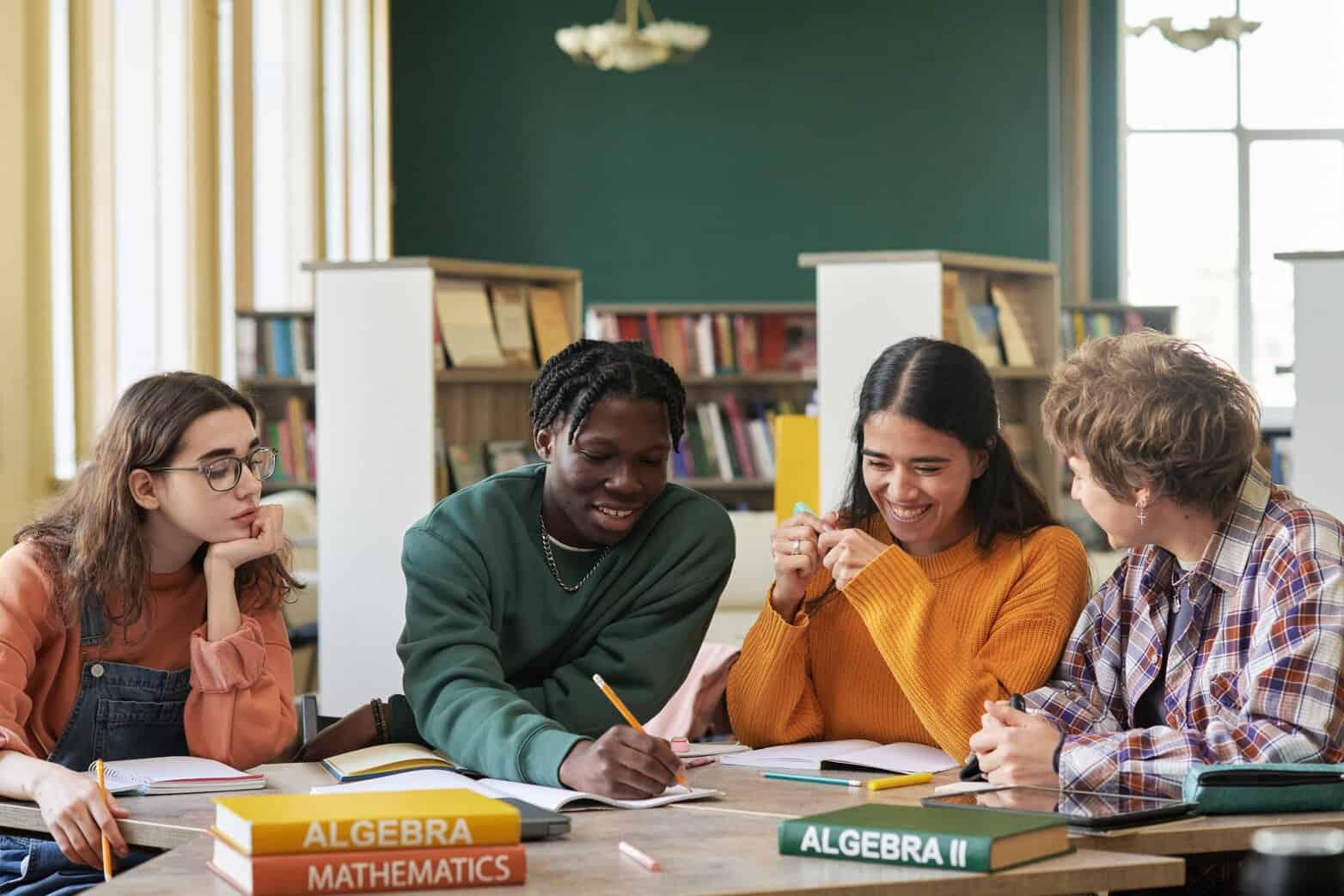












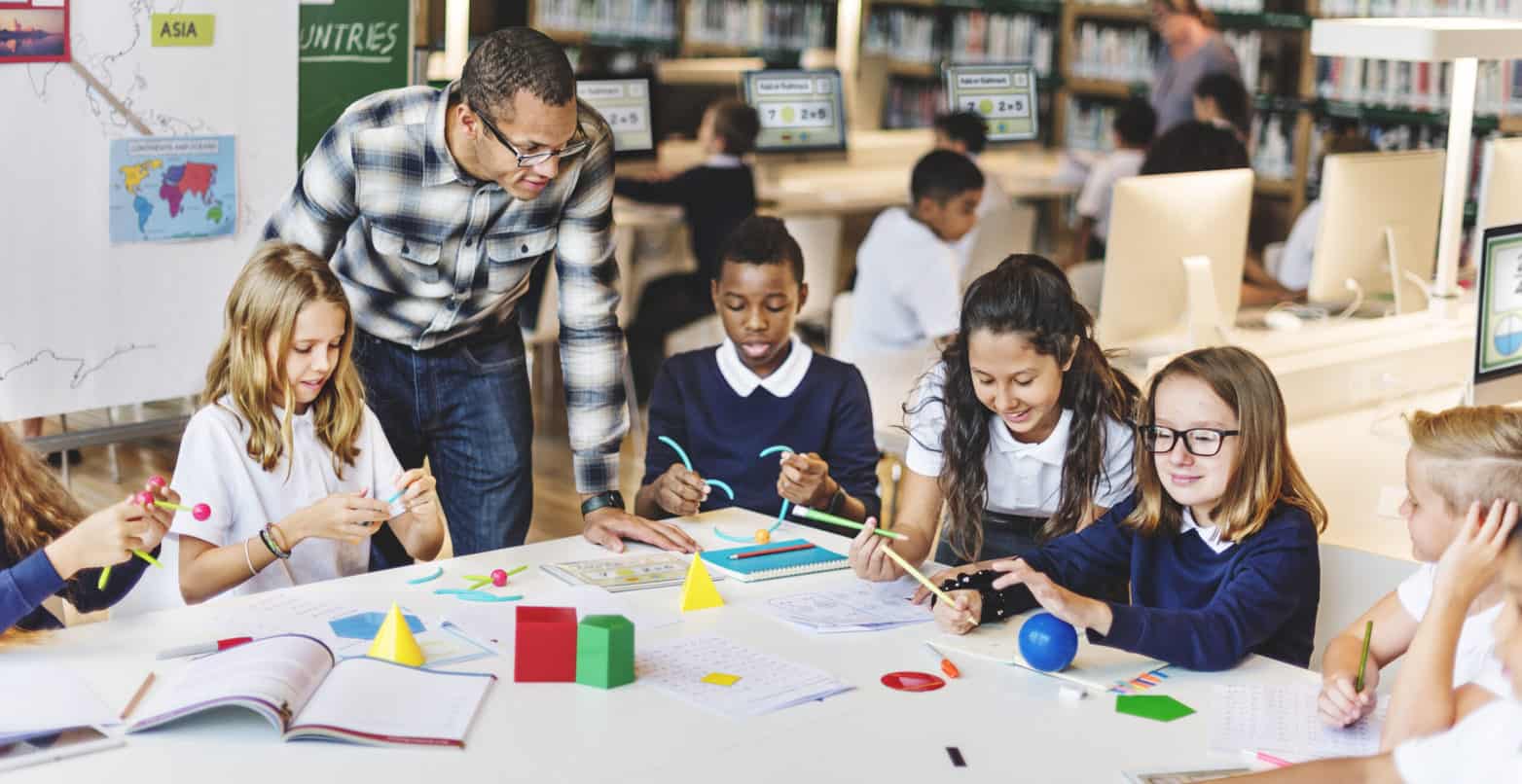



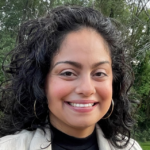
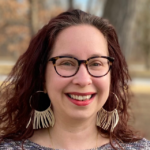
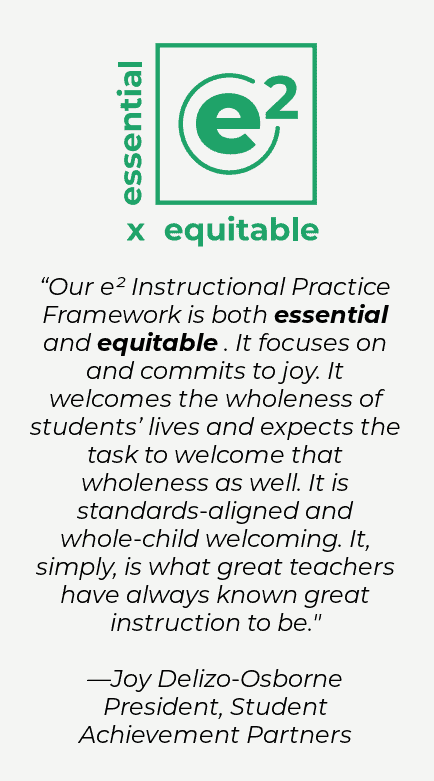

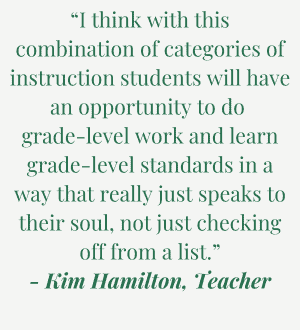

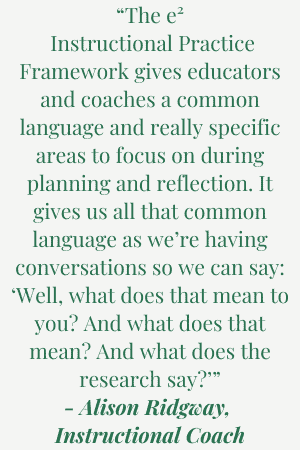
Hello! I am the Secondary Math TOSA for my district and I am interested in receiving the framework.
This is great work!